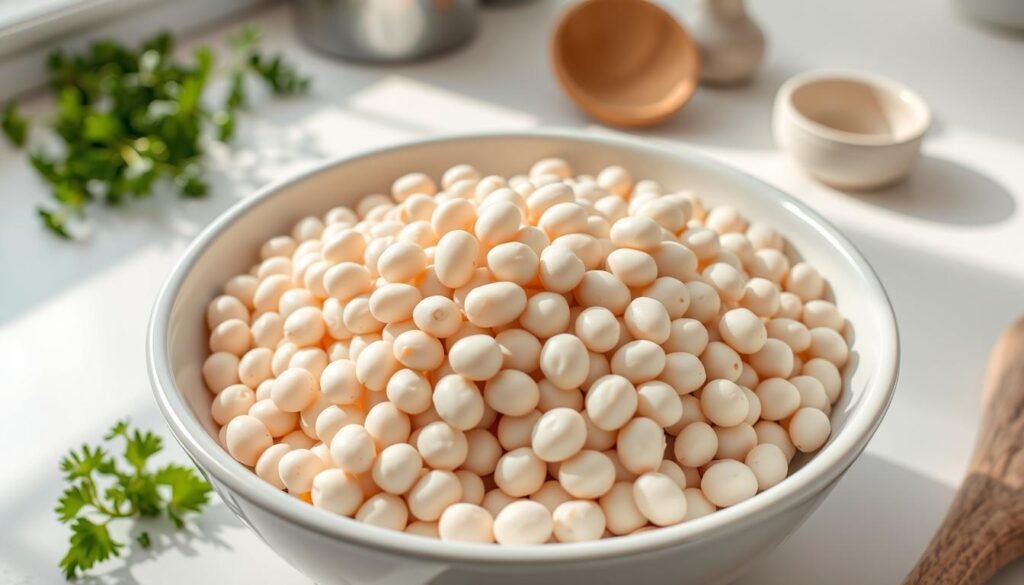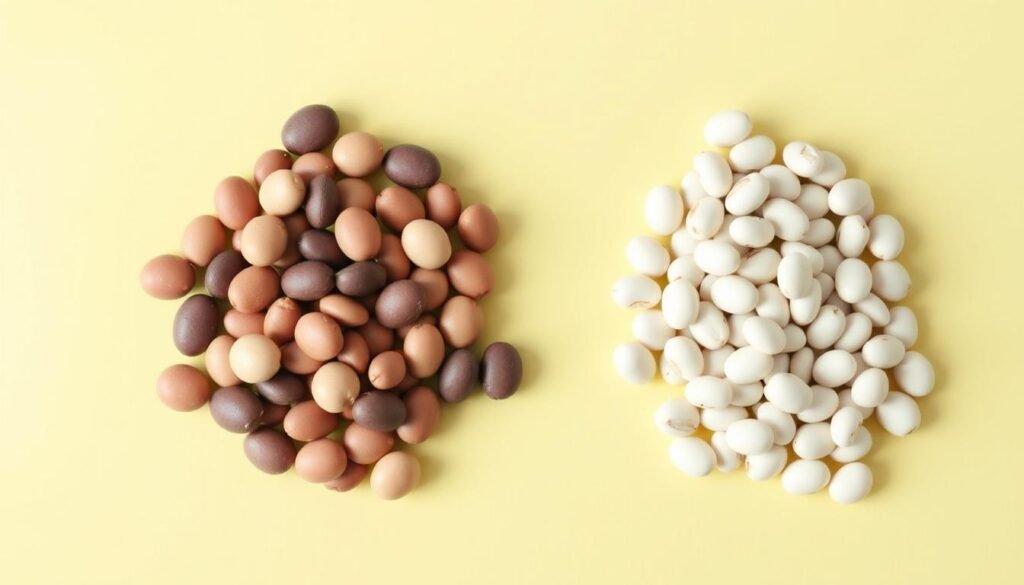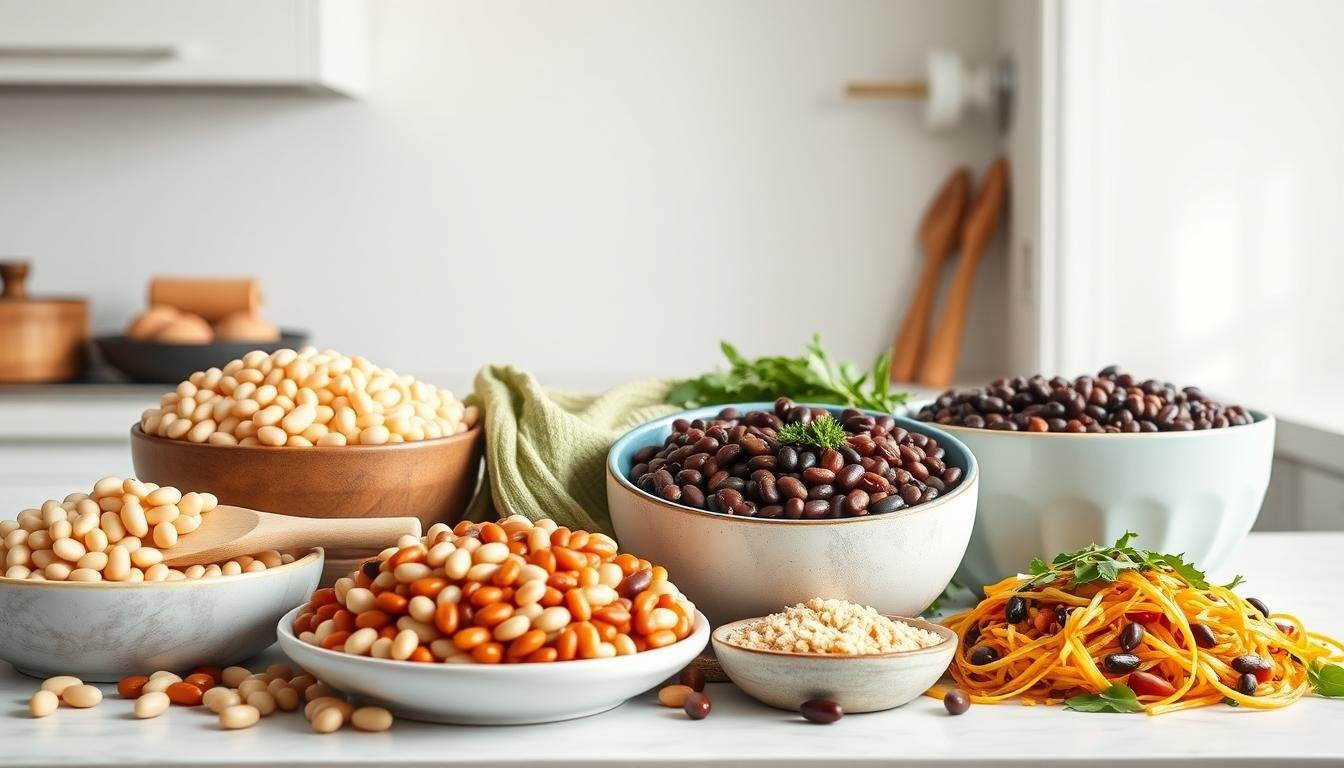Did you know less than 10% of Americans get enough fiber each day1? Great Northern beans are here to help. They’re not just cheap; they’re also packed with nutrients. Each 1-cup serving has 12.39g of fiber1.
As you read on, you’ll learn how Great Northern beans can make your food better and healthier.
Key Takeaways
- Great Northern beans are a versatile and nutritious legume with a delicate, creamy texture and mild, subtle flavor.
- They are a budget-friendly pantry staple that can be used in a wide range of dishes, from soups and stews to salads and dips.
- Great Northern beans are an excellent source of fiber, protein, and other essential nutrients, making them a valuable addition to a healthy diet.
- Increasing the intake of Great Northern beans and other legumes may help lower the risk of chronic diseases like heart disease, high blood pressure, and type 2 diabetes.
- With their versatility and health benefits, Great Northern beans are a must-have ingredient for any home cook’s kitchen.
Introduction to Great Northern Beans
Great Northern Beans, also known as white beans, are a versatile legume. They have a mild flavor and a creamy texture. These beans are packed with nutrients, including complex carbs, protein, fiber, and vitamins and minerals2.
What are Great Northern Beans?
Great Northern Beans are a type of white bean. They are bigger than navy beans and have a smooth texture. Their flavor is subtle and slightly sweet, making them great for many dishes2.
Nutritional Benefits of Great Northern Beans
One serving of great northern beans has 6.7 grams of protein and 6.2 grams of fiber. They are rich in polyphenols and folate, copper, and fiber3.
| Nutrient | Amount per Serving | Percentage of Daily Value |
|---|---|---|
| Protein | 6.7 g | – |
| Dietary Fiber | 6.2 g | – |
| Polyphenols | 1538.9 mg | Best Source (>50% DV) |
| Vitamin B9 (Folate) | – | Excellent Source (37% DV) |
| Copper | – | Excellent Source (28% DV) |
Great northern beans have a Nutrivore Score of 419, making them very nutritious3. This score changes based on how they are prepared and processed. Raw beans have the highest score3.

“Great northern beans are a versatile and nutritious addition to any diet, providing a range of essential nutrients that support overall health and well-being.”
Great Northern Beans vs. Navy Beans
Great northern beans and navy beans are both white beans. But they differ in texture and taste. Great northern beans have a thinner skin and are tender. They’re great for soups, salads, and chili4.
Navy beans have a thicker skin and are creamier. They’re perfect for stews, dips, and baked dishes4.
Texture and Flavor Differences
Great northern beans taste mild and nutty, with a firm yet tender flesh5. Navy beans have a richer flavor and a creamier texture4. Knowing these differences helps you pick the right bean for your dish.
Culinary Applications
Great northern beans are perfect for light dishes like salads and soups. Their subtle flavors are a highlight. Navy beans are better for hearty dishes like stews and baked beans45.
Navy beans and great northern beans are both rich in protein and fiber45. When substituting, think about the dish’s texture and taste you want.
Choosing between great northern beans and navy beans depends on your taste and the dish. Both are nutritious and can make many tasty meals.

Versatile Culinary Uses for Great Northern Beans
Great Northern beans are a versatile ingredient that can elevate a wide range of dishes. These small to medium-sized white beans, similar in size to cannellini beans, are a culinary chameleon. They can be seamlessly incorporated into soups, salads, dips, and even roasted as a tasty snack6.
In a stew, the creamy texture of Great Northern beans adds substance and creaminess to the dish. A recipe for stewed Great Northern beans takes approximately 35 minutes to prepare. The beans are recommended to simmer for at least 10 minutes, or up to an hour, for maximum flavor6. For a heartier soup, simply toss in a can of drained and rinsed Great Northern beans, or create a bean-based soup from scratch, simmering the beans until tender.
Great Northern beans also make an excellent addition to salads, providing a protein-rich base that complements a variety of fresh ingredients. The mild flavor of these beans allows them to absorb seasonings beautifully, making them a versatile choice for dips and spreads as well. Nutritional experts recommend incorporating pulses like beans and lentils into your6 to support overall health.
If you’re in the mood for a crunchy, nutrient-dense snack, try roasting Great Northern beans. Toss the beans with a bit of oil and your favorite seasonings, then bake until crispy. The result is a satisfying, protein-packed treat that’s easy to enjoy on the go7.
| Culinary Use | Preparation Time | Key Ingredients |
|---|---|---|
| Stewed Great Northern Beans | 35 minutes | Shallot, yellow squash, kale, Roma tomatoes, vegetable broth, sherry vinegar |
| Great Northern Bean Soup | Varies | Variety of fresh vegetables, herbs, and seasonings |
| Great Northern Bean Salad | 10-15 minutes | Mixed greens, vegetables, herbs, vinaigrette |
| Great Northern Bean Dip | 15-20 minutes | Garlic, olive oil, spices, lemon juice |
| Roasted Great Northern Beans | 20-25 minutes | Oil, seasonings of choice |
With their mild flavor and ability to absorb a wide range of seasonings, Great Northern beans are a versatile ingredient. They can elevate any recipe. Whether you’re whipping up a creamy soup, a protein-packed salad, or a crunchy snack, these nutrient-rich legumes are a great addition to your culinary repertoire687.

Health Benefits of Great Northern Beans
Great Northern Beans are packed with nutrients, offering many health benefits. They are a great source of fiber, with over 10 grams in one serving9. This fiber is key for a healthy digestive system, blood sugar control, and feeling full. They also provide plant-based protein, making them good for vegetarian and vegan diets9.
High in Fiber and Protein
A 100-gram serving of Great Northern Beans is a nutritional powerhouse. It has 118 calories, 21.1 grams of carbs, and 7 grams of fiber9. The beans also offer 8.3 grams of protein, helping those who want more protein in their diet9.
May Lower Risk of Chronic Diseases
Eating Great Northern Beans regularly may reduce the risk of heart disease and type 2 diabetes9. They have a low glycemic load of 7, which is good for blood sugar control9. They also help lower cholesterol and improve blood sugar control over time9.
The high fiber in Great Northern Beans is linked to lower death rates from heart disease and cancer9. Adding these beans to your diet can make your meals more nutritious and offer health benefits910.
“Consuming a serving of great northern beans can provide more than 25% of the daily recommended intake of folate for a 2,000-calorie diet.”9
| Nutrient | Amount per 100g Serving |
|---|---|
| Calories | 118 |
| Fat | 0.5g |
| Sodium | 2mg |
| Carbohydrates | 21.1g |
| Fiber | 7g |
| Sugars | 0g |
| Protein | 8.3g |
| Iron | 2.1mg |
| Potassium | 391mg |
| Magnesium | 50mg |
| Zinc | 0.9mg |
| Selenium | 4.1mcg |
| Vitamin B6 | 0.1mg |
| Folate | 102mcg |
Great Northern Beans: A Pantry Staple
Great northern beans are a great choice for your pantry. They have a mild, nutty flavor and a meaty texture. This makes them perfect for many dishes11.
These beans are easy to store because of their long shelf life and compact size. They’re great for soups, salads, or dips. They can make your meals better without costing a lot12.
Great northern beans are also good for your wallet. They’re affordable and filling. Plus, they’re full of protein, fiber, and antioxidants. This makes them a healthy choice for your meals11.
Whether you’re a pro in the kitchen or just starting, great northern beans are a must-have. They’re versatile and last a long time. They can help take your cooking to the next level12.
“Great northern beans are a real unsung hero in the kitchen. They’re so versatile, budget-friendly, and packed with nutrition – a true pantry staple!”
Cooking with Dehydrated Great Northern Beans
Dehydrated Great Northern beans are easy to use in cooking. They have a mild, nutty taste and a soft yet firm texture. Rehydrating and preparing them is simple. This makes them great for adding to many dishes.
Rehydrating and Preparing
To rehydrate dehydrated Great Northern beans, soak them in water for hours or overnight. If you only have 10 minutes, add 10 more minutes to cooking time13. After soaking, cook them until they’re tender, which takes 45 to 120 minutes14.
Creative Recipe Ideas
Once the beans are ready, you can use them in many ways. Add them to soups and stews, or make fresh salads. You can also mix them into creamy dips or even baked goods13. Their mild taste makes them perfect for many recipes.
“Great Northern beans are a kitchen staple that I always keep on hand. They’re so easy to prepare and work wonderfully in everything from comforting soups to flavorful dips.”
Use dehydrated Great Northern beans in bean stew, salads, or creamy dips. They’re a healthy and convenient choice for any dish13. By cooking these beans, you open up a world of tasty possibilities1314.
Storing Dehydrated Great Northern Beans
Keeping dehydrated great northern beans in good shape is crucial. Store them in a cool, dry place in airtight containers15. This stops moisture and heat from spoiling them and reducing their nutritional value15. Always check the beans for any color changes, bad smells, or pests before using them15.
Proper Storage Techniques
Many legumes can be stored, like Adzuki, Black, and Great Northern beans15. Beans are graded from U.S. No.1 to U.S. No.3 based on quality15. Polyethylene bags can keep beans fresh for over a year; #10 cans or Mylar bags can last up to 10 years if oxygen is removed15.
Food Safety Considerations
Pinto beans stayed good for up to 30 years in storage15. They are high in protein and fiber, and rich in minerals and vitamins15. The EPA says dried beans are safe to eat, even with some cyanide15. But, vitamins in dried beans start to break down after 2-3 years, and most are gone in about five years15.
By sticking to these storage and safety tips, you can enjoy dehydrated great northern beans for a long time.
Historical and Cultural Significance
Great Northern Beans have a rich history, dating back to Native American tribes16. They were first grown in southern Mexico and Peru over 7,000 years ago16. Tepary beans were grown in northwestern Mexico and the southwestern U.S. around 5,000 years ago16.
European settlers loved these beans and took them with them as they moved17. Beans and peas have been part of many cultures for centuries. Ancient Egyptians and Romans believed they connected us to the spirit world17. Beans have been key in many dishes, like medieval stews and Italian Pasta e Fagioli17.
Today, Great Northern Beans are enjoyed all over the world18. They are part of the common bean family, one of the first crops in the Americas18.
Learning about Great Northern Beans’ history and culture helps us appreciate their value. These legumes have been important in many cultures for centuries171816.
Incorporating Great Northern Beans into Your Diet
Adding great northern beans to your meals is easy and tasty. They fit well in soups, stews, salads, and dips. Their mild taste and creamy texture work in both savory and sweet dishes19.
Great northern beans are great for those who want more plant-based protein or fiber. They’re also good for balancing your diet with carbs, proteins, and fiber19.
These beans are packed with folate, iron, potassium, and magnesium. They support your health and might even lower your risk of heart disease19.
For people with diabetes, great northern beans can help control blood sugar. Their fiber also boosts digestive health and helps with weight control19.
Dehydrated great northern beans are easy to store and keep their nutrients. They’re light and compact, lasting months or years in a cool, dry place19.
You can use rehydrated great northern beans in place of canned beans. They’re perfect for soups, stews, chili, salads, and grain bowls19.
Adding great northern beans to your meals is a smart choice. They’re nutritious, delicious, and offer many health benefits. They’re great for heart health, weight management, and digestion19.
Conclusion
Great northern beans are a versatile and nutritious staple for my kitchen. They have a delicate flavor, creamy texture, and are packed with nutrients. They fit well in many dishes, from soups and stews to salads and dips202122.
These beans are easy to use and won’t break the bank. One cup of cooked great northern beans is full of protein, fiber, and vitamins. They make my meals healthier and tastier2122.
Discovering the many uses and health benefits of great northern beans has improved my cooking. They help with heart health, weight management, and muscle preservation. I’m eager to use them more in my meals202122.
FAQ
What are Great Northern Beans?
Great Northern Beans are a type of legume. They have a creamy texture and a mild flavor. They are also known as white beans and are a nutritious staple.
What are the nutritional benefits of Great Northern Beans?
Great Northern Beans are packed with nutrients. They offer complex carbs, protein, fiber, and essential vitamins and minerals. These include folate, iron, potassium, and magnesium.
What are the differences between Great Northern Beans and Navy Beans?
Great Northern Beans and Navy Beans are both white beans. But they differ in texture and taste. Great Northern Beans are thinner-skinned and more delicate. Navy Beans have a thicker skin and a creamier texture.
How can I use Great Northern Beans in my cooking?
Great Northern Beans are versatile. They can be used in soups, stews, salads, dips, and even roasted as a snack. Their mild taste and ability to soak up flavors make them a great addition to any dish.
What are the health benefits of regularly consuming Great Northern Beans?
Great Northern Beans are rich in fiber and plant-based protein. They support digestive health, help regulate blood sugar, and may lower the risk of heart disease and type 2 diabetes.
How can I store dehydrated Great Northern Beans?
Store dehydrated Great Northern Beans in a cool, dry place. Use airtight containers to keep them fresh. This prevents moisture and heat damage, preserving their quality and nutritional value.
What is the cultural significance of Great Northern Beans?
Great Northern Beans have a long history. They were a staple for Native American tribes. Later, European settlers adopted them, carrying them across the continent. This shows their lasting importance in many cuisines.
Source Links
- https://balancingbowls.com/navy-beans-vs-great-northern-beans/ – Navy Beans vs Great Northern Beans – Balancing Bowls
- https://solidstarts.com/foods/great-northern-bean/ – Great Northern Bean for Babies – Solid Starts
- https://nutrivore.com/foods/great-northern-bean-nutrients/ – Great Northern Bean Nutrients
- https://www.liveeatlearn.com/navy-beans-vs-great-northern-beans/ – Navy Beans vs. Great Northern Beans: What’s The Difference?
- https://www.camelliabrand.com/4-types-of-white-beans-whats-the-difference/ – Discover 4 Different Types of White Beans | Camellia Brand
- https://cozypeachkitchen.com/stewed-great-northern-beans/ – Stewed Great Northern Beans
- https://www.thespruceeats.com/crock-pot-great-northern-beans-3054502 – Cook Up Some Amazing Beans In One Pot That You’ll Eat Again And Again!
- https://mvmagazine.com/news/2020/02/03/garlicky-great-northern-beans-and-broccoli-raab-over-toast – Garlicky Great Northern Beans and Broccoli Raab over Toast
- https://www.verywellfit.com/northern-bean-nutrition-facts-and-health-benefits-5072085 – Northern Bean Nutrition Facts and Health Benefits
- https://www.1000springsmill.com/pages/great-northern-beans?srsltid=AfmBOopkC9IWYqR2c6bLtXujCkJIsD1fHjSPWry2eZ6eCHcSW2nJ-2ZF – Great Northern Beans Health Benefits – 1000 Springs Mill
- https://herbivoreskitchen.com/2021/01/white-beans-the-ultimate-guide/ – White Beans: The Ultimate Guide
- https://motherearthproducts.com/products/dehydrated-great-northern-beans?srsltid=AfmBOopsiS-flBTGJ4eKshPMNc_UBNRVXj9H4Hf-8zgf3pRTWvYztfCH – Dehydrated Great Northern Beans
- https://thebigmansworld.com/great-northern-beans-recipe/ – Great Northern Beans Recipe
- https://www.simplyrecipes.com/recipes/how_to_cook_dried_beans/ – A Complete Guide to Cooking Dried Beans (It’s Easy!)
- https://extension.usu.edu/preserve-the-harvest/dev/storing-dry-beans-1 – Storing Dry Beans
- https://cablevey.com/history-of-dried-beans-how-it-all-started/ – History of Dried Beans – How It All Started – Cablevey Conveyors
- https://www.camelliabrand.com/cultural-culinary-traditions-involving-beans/ – Cultural and Culinary Traditions Involving Beans
- https://www.sciencedirect.com/topics/agricultural-and-biological-sciences/great-northern-beans – Great Northern Beans – an overview
- https://motherearthproducts.com/blogs/informative/delicious-and-nutritious-the-power-of-dehydrated-great-northern-beans?srsltid=AfmBOoqIzBPhQ5PO0_wMU7ddfmg5Gpy2Kh0PucUz3aAeY94oB948oA3m – Delicious and Nutritious: The Power of Dehydrated Great Northern Beans
- https://www.healthifyme.com/blog/northern-beans/ – Northern Beans – Health Benefits, & Adverse Effects – HealthifyMe
- https://be-still-farms.com/blogs/healthy-organic-living-blog/health-benefits-of-great-northern-beans-a-nutritional-powerhouse – Health Benefits of Great Northern Beans: A Nutritional Powerhouse
- https://www.livestrong.com/article/255179-great-northern-beans-nutrition/ – Great Northern Beans Nutrition | Livestrong.com

